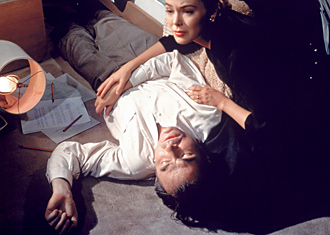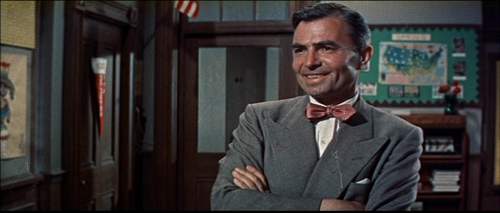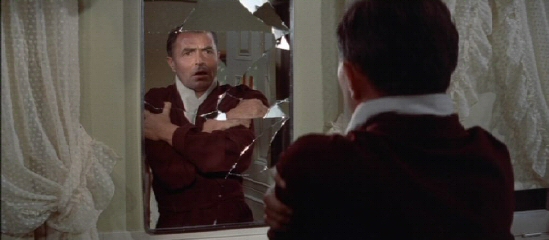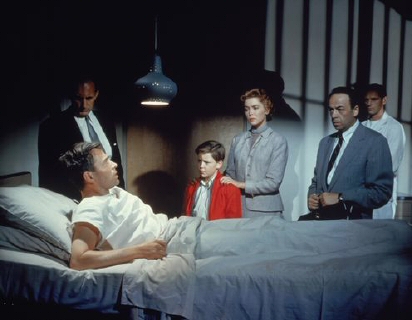
SECOND CHANCES
christopher funderburg
NICHOLAS RAY: Part II
Despite their reputations, some films and filmmakers just don't do it for the writers of The Pink Smoke. This series, Second Chances, follows Funderburg and Cribbs in their attempts to find greatness where they've previously failed to see it; to actively make an effort to appreciate esteemed artworks for which they currently have a distaste (or feel indifference). They'll give cult favorites like Let the Right One In another shot and dig deep in the filmographies of beloved auteurs whose appeal baffles them (like Nicholas Ray) - and with a little luck, maybe they'll even emerge as newly-minted fans...
<< click here for Nicholas Ray: Part I >>
<< click here for Nicholas Ray: Part III >>
<< click here for Nicholas Ray: Part IV>>
Bigger than Life

Part I of this re-consideration of cinema's third or fourth most-beloved one-eyed auteur* deals a lot with the critical perceptions of director Nicholas Ray and those concerns dominated my reaction to Bigger than Life. The stumbling block with the film (and Ray in general) is proportionality: the film looms large in the critical imagination and, to me, the reality of the movie seems an entirely different size and shape. I enjoyed Bigger than Life a great deal - and, if it didn't have any kind of reputation, I would probably make a special point to recommend it to folks. But here's the catch: the film is immensely enjoyable and builds to an undeniably rousing ending, but its pleasures are of the ludicrous, campy variety. The film is hilariously risible and an amusing mixture of shameless and knowing - it panders to the cheap-seats with an erratic dumbness that's too charming and forceful to be the work of a moron. Adjectives like "cheesy," "silly," and "leering" (which are never used to describe the film) are just as applicable as "exuberant," "powerful" and "intoxicating" (all of which were used recently by critics).** The film has gusto and disinhibition on its side - although, I also should mention that even those qualities are on short supply until the last twenty minutes or so - and even though I wouldn't hesitate to say I enjoyed it, I would never say that it was, you know, good.
In 1957, Truffaut called it one of the Ten Best films of Year (Godard picked another Ray, Bitter Victory, for his list and left this one off) and in his chapter on Ray in The Films in My Life, he argued passionately and eloquently at length on behalf of the film. But any attempt to canonize it is a dubious proposition and to suggest it's an artwork of a stature comparable to Federico Fellini's Nights of Cabiria or Elia Kazan's A Face in the Crowd by placing them beside each other on a "Best of" list (as Truffaut did) is more than a little silly and, honestly, kind of embarrassing. It's a film that wilts under any kind of serious consideration (and almost certainly wasn't designed with any serious intentions in mind) - an essentially idiotic idea rendered with a certain amount of all-too-earnest enthusiasm and lurid willingness to push the audience's buttons. You could argue that the film has a certain self-awareness (the enjoyable dark comedy towards the end is almost certainly intentional), but I'm not sure that any amount of intelligence, knowingness or sly subversion would be enough to overcome its after-school special premise. I mean that literally: the film has a premise (and approach) identical to the after-school specials produced for television in the 70's that defined the genre.
The film follows James Mason as an average school-teacher, a particularly affable and hard-working suburban family man - he even takes on a second job as a taxi dispatcher to support his family's middle-class lifestyle. Seemingly everyone he runs into on the street likes and respects him, especially his adoring wife and chipmunk-cheeked son. After a couple fainting spells, Mason finds out that he has a chronic inflammation of his veins that will almost certainly be fatal without significant medical intervention - for the rest of his life, he'll need to take The Miracle Drug! cortisone in order to alleviate the arterial pain which plagues him. After a little financial stress and some thoughtlessness, Mason goes off-dosage and becomes a full-blown Miracle Drug! addict, self-medicating himself into an arrogant and implacable lunatic whose shocking behavior ranges from being mean to his meek wife to being mean to his meek son. He is also rude to a somewhat less meek PTA member.

First twenty minutes are brutally boring and I didn’t think I was going to make it through the rest of the film. The self-described "dull" Mason goes about his decidedly dull life. There's a couple scenes at the high school, a little bit about him hiding his dispatcher job from his wife (he's worried she'll be embarrassed about him dipping below his station to make ends meet), some reminiscing with his son about high school football glory and an uneventful bridge game before Mason first falls to his knees, clenching at his chest as his worry-wart wife hovers nearby. The early going is rough by standard and, for whatever reason, these early scenes tested the holy living fuck out of my patience. To say that the film meanders tediously through "Leave it to Beaver" style suburban dullness might falsely imply an element of self-parody or stylization, which is decidedly not the case. The film is simply putting its ducks in a row to shoot them down later: this is Mason's average, enviable life; at some point you'll get to watch it all fly into chaos.
Once Mason begins to over-indulge in The Miracle Drug! cortisone, the film settles into an agreeable series of scenes that follow his increasingly abusive behavior and growing obsession with creating a rigorous new system of education. There's a great scene where he delivers an enjoyable offensive speech about "curing the disease of childhood" to a shocked classroom of parents on a parent-teacher night. Walter Matthau (who plays his best friend, the gym teacher) looks on in disbelief. When Mason catches him voicing his concerns to Mason's wife, Mason decides they are having an affair and want him out of the picture. Only Mason's dedication to the physical and mental refinement of their fat-faced, sloppy-haired son prevents him from abandoning his wife altogether. There's a fantastic sequence that escalates the ridiculous behavior of Mason as he first physically breaks his son in a punishing game of catch followed by him heaping completely unwarranted verbal abuse on the milkman followed by him putting his son through a taxing, endless gamut of word-problems that have absurd answers like "97.534."
The whole film builds to a memorable howler of a line during the climax. Mason decides that the folks at his church are a bunch of pin-headed hypocrites and it's his duty to make like Abraham with his own wonderfully charmless son. In order to preserve his son's purity in the face of a corrupt and disgusting world, he and his wife need to murder to kid. His wife pleads with him: but God sent an angel to Abraham on the mount! God stopped the murder! Mason: "God was wrong." And then Walter Matthau shows up. They wrestle through the staircase banister, knock over the sofa and somehow turn on the tv which provides a soundtrack of uninterrupted calliope music. I guess there was some kind of documentary about carnivals on. They get Mason to the hospital and back on the proper dosage of cortisone. But not off of the drug completely. Because The Miracle Drug couldn't possibly be to blame for any psychosis on the part of its users.
Truffaut has said that "the bully" is the essential Ray protagonist and this film meets that definition as well as any film possibly could. It's a fascinating idea to consider because Bogart's Dixon Steele from In a Lonely Place uses both his acidic wit and physical dominance to constantly cut down everyone around him. If that's actually a running idea with Ray, then I'm with it. For what it's worth, watching Bigger than Life I was reminded again and again of one of my favorite cinematic bullies: Terry O'Quinn in The Stepfather. Working a fantastic script by the perpetually underrated Donald E. Westlake, Terry O'Quinn embodies all of the subversive cultural critique, razor-sharp humor and genuine sense of terror generally attributed to Ray's film. He's the personification of suburban pressures of family and class bottled up too tightly and ready to blow – in Terrence Rafferty’s words, "He's just another nuclear family reactor." It's a resourceful and clever film that uses its genre to spin incisive commentary out of laughs and horror. In other words, The Stepfather actually is what critics clam Bigger than Life to be. I'll tell folks to check out Bigger than Life, but warn them that "It's pretty stupid." I would recommend The Stepfather without disclaimer.
That said, I still think Ray's film is somewhat thematically interesting in that Mason's character never steps outside of the moral boundaries set up by the tedious early-going – his psychotic ideas about education and fidelity and religion and hard-work are spun from exactly the same material from which his average, "dull" existence is fashioned. Whacked-out on the Miracle Drug pinkies, he is still exactly himself, only moreso. On the most obvious level, he's a teacher who becomes more obsessed with education. He takes the mission of primary education – to turn the mess of childhood into the order of maturity – to its logical extremes with his strict system to cure children of their childishness. He yearns the consumer comforts of a middle-class life (hence the second job) and on the Miracle Drug! he takes the next step in materialism and buys his wife expensive dresses. He breathes in the air of high school football nostalgia; on the pills, he actively attempts to relive those past glories. Before the pills, he wants the best for his son; after, he really wants the best for his son – the spiritual purity available only through the stasis of death. Even though the film ends with a loving reconciliation of husband and wife, father and son, it's definitely intentionally tweaking all those middle-class anxieties in its audience. If I were being generous, I would say that it has more on its mind than all of those lurid anti-drug films that lovingly indulge in anti-social behavior and moral liberation only to pull back at the last second and reconfirm the values being eschewed by the druggie protagonist. But on the other hand, one could easily make the case that this is just another simplistic cautionary tale that has no real intention of challenging any mainstream value systems. Depends on your mood.

I have no choice but to be less kind to the aesthetics of the film. Truffaut claimed it has "three or four of the most beautiful close-ups [he has] had the chance to see since the advent of CinemaScope," but the only shots that stand out in my mind are ones that are notably terrible. For instance, the film contains what is inarguably the worst visual metaphor in all of le cinema: our hero, realizing he is losing control of his life, of his very sanity, gazes with wild eyes into a cracked mirror. This one is particularly egregious because Mason embarces himself and strokes his own shoulders at the same time. The Mirror Crack'd, indeed.*** Also, early on, I thought the film had successfully avoided employing one of my pet peeve tactics: someone opens a door with a mirror on it and when they close that mirrored door – surprise! - there's now someone visible in the mirror. Bigger than Life sets up such a moment in one of the first scenes where Mason is rifling through his medicine cabinet, jonesing for a dose. When he closes the mirror and there is no one visible, I actually thought, "Oh, wow, I'm glad they didn’t pull the ol' sneaky mirror." But then at the end of the film, when his son is rifling through some drawers looking for the cortisone, he moves a mirror on top of the dresser and oh my God, Mason is standing right behind you, dude! Oh, well.
I honestly can't recall any close-ups, but the cinematography has the lush, pretty qualities standard in Technicolor 'Scope. In both this film and In a Lonely Place, it seems fairly clear that intricate camera movements and elaborately choreographed shots aren't Ray's interest, so the film is fairly static in its construction and editing. That's probably also a bit of stumbling block for me with Ray as well - most mettuers-en-scene are notable for what they put in the scene and, from what I've seen, Ray just isn't a visually flamboyant or technically ambitious filmmaker. I would describe Rebel without a Cause, In a Lonely Place, Johnny Guitar and Bigger than Life as "standard" in their aesthetic choices. All three look ok, but there's nothing particularly memorable about them either. There's a shot of the cabs lined up at the depot that looks pretty great, but Bigger than Life doesn't really have any visual pleasures.
Also, another thing that bothered me about the film: it's based on a New Yorker article that Mason read and to which he purchased the rights to turn into a movie. Several sources, most prominently Bernard Eisenschitz's massive Nicholas Ray: An American Journey, make a lot of hay about how Ray refused to back down in the face of the powerful pharmaceuticals industry and adapted the muck-raking investigative piece for the big screen in spite of their protests. He only made a small concession: the manic, psychotic behavior of Mason's character would be caused by going over the prescribed dosage, whereas in real life the insanity was caused simply from following the doctors' orders to the letter. And the film doesn't mention that the cortisone doesn't cure anything, it only relieves pain. But it does have several level-headed doctors say "the miracle drug" is Mason's "only chance for survival." So, the only concession Ray made was being completely dishonest and misrepresenting reality to the benefit of a corrupt business entity. And reassuring audiences that a dangerous, virtually useless drug was a safe and necessary life-saver.

But finally, let's just go back to the critical reaction to this film for one moment. I think you can get a pretty good sense of what this movie is like, so here's an illustration of disproportionate critical response: "A Nietzschean assault on Rockwellian banality. – Artforum" I suppose that quote mainly proves that critics are very at home with hyperbole. Rockwell, sure. Nietzsche? Jesus fucking Christ. Some people will write anything. Up next: Hollywood rebel Nick Ray's subversively Freudian, ante-Post-Modern, gender-role-shattering psycho-super-western Johnny Guitar!
(continued on page 2 of "Second Chances: Nicholas Ray: Part II")
* Fritz Lang, John Ford, Raoul Walsh. He comes out just ahead of Andre de Toth.
** The word "expressionistic" (used in reference to the film by David Fear of Time Out New York) still does not apply.
*** Actually, Goin' Crackers wouldn't be a bad title for this film.
<<Previous Page 1 2 Next Page>>
home about contact us featured writings years in review film productions
All rights reserved The Pink Smoke © 2009